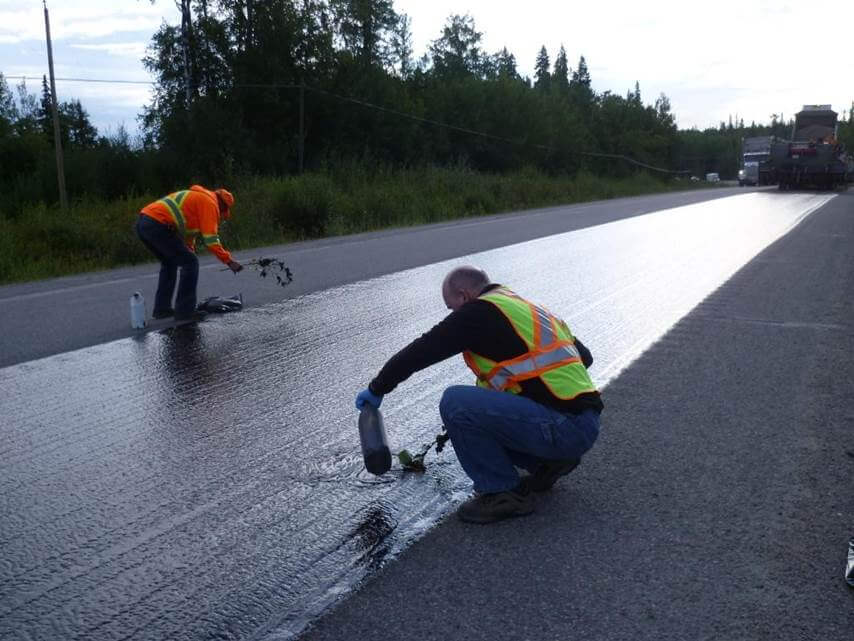Regardless of whether your asphalt is old or new, it’s still susceptible to holes and cracks. Besides, it can look faded, old, and very dull a few months after its installation. Now, that’s where the need for sealcoating comes in.
Typically, a sealcoat or asphalt sealer is a mixture of different liquids and tiny particles like sand. The sealer acts as a protective film for your asphalt paved surface. Asphalt sealers protect your asphalt from exposure to different elements like water, air, chemical spills, and UV rays from the sun that can cause damage. This reduces the chances of developing holes and cracks. Moreover, sealcoating helps in restoring the dark, black appearance of an asphalt surface, while also preventing it from becoming slippery.
4 major ingredients of sealcoat
Today, there are two major types of asphalt sealers—coal tar-based and asphalt emulsion-based. However, let’s look at the 4 major ingredients required to make an asphalt sealer:
- Binder – this is the major ingredient of asphalt sealers, and it helps in binding together all the other ingredients. Besides, the binder provides protection to the asphalt surface, gives it the deep black appearance, and binds the sealer mixture to the asphalt surface,
- Aggregates, clay, and fillers – these three ingredients give the mixture the tensile strength, dimensional strength to mix, and toughness it needs. Besides, it helps in reducing the rigidity of the surface, thus allowing it to function normally, even at high temperatures.
- Water – this is the medium used to disperse all the other ingredients. Water is responsible for the fluidity of the sealant and makes it easier to handle, store, and apply the sealant.
- Additives – today, we have a variety of additives used in an asphalt sealer mixture, and they have different purposes. Some additives help the sealcoat to dry fast, increase water repellency, alter sand suspension, add resistance to petrochemicals and salts, and improve flexibility.
With that, let’s look at the two major types of asphalt sealers, and what they are made of.
Coal tar-based sealers
Typically, coal-tar based asphalt sealers are emulsions that comprise coal tar, water, additives, and emulsifying agents.
- Coal tar – this is a byproduct of coke-oven tar. We get this residue after refining oils for consumer or industrial use. First, the product is refined and separated into 12 grades, depending on their viscosity, and each of these has its use. RT-12 is the most viscous grade, and it’s used to produce coal tar sealers.
- Emulsifying agent – this is a water-soluble and soap-like product, which consists of hydrocarbon tail and ionic head. These two molecules give the coal tar particles an electric charge, and this causes them to resist each other. This is what makes them remain suspended in water.
- Additives – a coal tar sealant concentrate consists of clay, sand, as well as polymer additives, which helps in improving its ease of application and durability. Since coal tar asphalt sealers are produced and regulated to meet set federal standards, professionals the mixture of the additives helps the professionals to achieve different results.
Now, after applying the sealant, the emulsifier destabilizes, thus allowing the particles in the mixture to bond, and create a strong film.
Asphalt-based sealers
These are asphalt emulsions made of asphalt, water, and an emulsifying agent.
- Asphalt – this is a refined product of crude oil and makes up around 50% – 75% of a normal asphalt emulsion. Asphalt differs from coal tar in its production. That means different crude oil refineries produce asphalt with unique properties, and this can affect the sealant’s viscosity. Besides, because asphalt is a petroleum-based product, it also resembles petroleum-based fluids and fuels. That means asphalt doesn’t repel fuels.
- Emulsifying agent – these emulsifiers are used to achieve the same results like the ones used in coal tar sealers. However, the emulsifiers used in asphalt-based sealers differ depending on the chemical properties and compositional differences of the asphalt used. Unlike coal tar that is standardized, asphalt is a bit more variable. Thus emulsifying agents are used for chemical compatibility, which helps to create a strong emulsion.
- Additives – polymer and non-polymer sealants are the two common additives used in asphalt emulsions. Typically, the additive can be waterborne vinyl or waterborne acrylic resin. However, the temperature and local environment will determine the type of additive used in the mixture. However, caution must be observed when mixing additives, because asphalt-based sealers are not standardized, and might have chemicals that are not compatible with some forms of additives. For instance, you cannot mix an asphalt emulsion with an anionic emulsifying agent with a cationic polymer emulsion. Doing so can make the agents gel, thus affecting the effectiveness of the products.
Bottom Line
The sealcoating contractors at ABC Paving say that sealcoating your driveway or pavement can improve the curb appeal of your property, and increase its value in the long run. Generally, sealcoating your asphalt paved surface is a cost-effective way of reducing the need for costly repairs in the future. This makes asphalt sealers a good investment for your property. You should sealcoat your pavement or driveway after every 2 – 3 years, and this can go a long way in keeping your driveway in a good condition.




